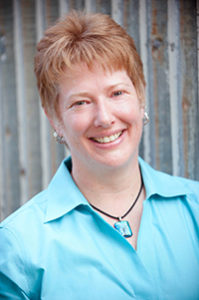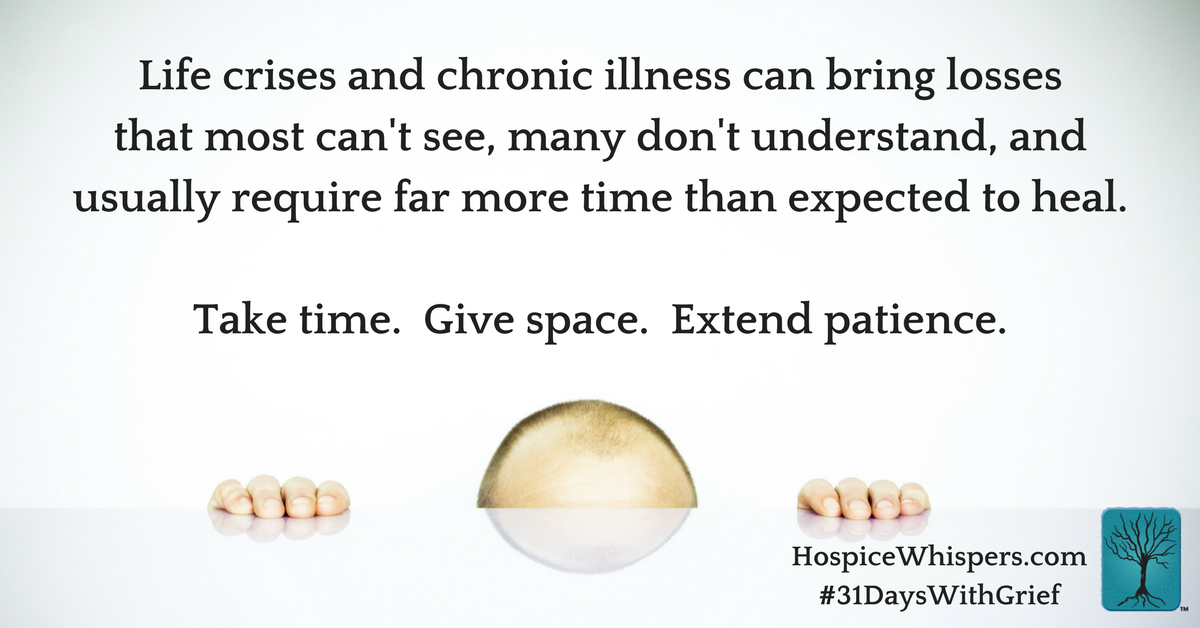31 Days of Walking with Grief: Others’ and Our Own
Day 22—Sense of Loss After Crisis & During Chronic Illness
This is a month-long series to support persons grieving and those who love them. It includes content from “Sharing Our Stories: A Hospice Whispers Grief Support Workbook” available through Amazon and wherever books are sold.
In my last post, I wrote of the impact of not just the primary losses we experience, but also the secondary losses of safety and security, connection and identity, future hopes and dreams, etc.
I’ve also written about Disenfranchised Grief, that which is not known about or understood by others, leaving the one grieving a loss even more alone, and even feeling judged.
Both dynamics come into play after a person has gone through a crisis that has seemingly resolved well and when persons go through chronic illness.
In the former, folks wonder, “It’s all ok now! Why are you still so freaked out?” In the latter, persons don’t understand what chronic illness does to a person’s physical self, emotional and mental health, relationships, income, and so on. Failing to understand fully what it’s like, they get impatient and/or judgmental with the person who is already suffering.
More of my story…
In 2012, as I’ve written before, I was preparing to compete in an Olympic distance triathlon. I began having shoulder pain my doctor feared was coming from a neck injury when I was rear ended in my car a few years before. She ordered and MRI that came back with some incidental findings—one kidney was dead, the other was inexplicably enlarged, and I had solid (read: possibly cancerous) masses on my uterus and ovaries.
I’ve always been fairly healthy. I was running 20-25 miles a week, biking 90, and swimming 5. I was about to do a century (100 mile) ride. I had a race to run. I did not have time for this. It wasn’t on the agenda! I told them to close the hood and stop looking.
But my life changed overnight as we tried to decide where to start. I gained 6 new specialists overnight and had 20 hours’ worth of doctors’ appointments a week as we did scans and tests and tried to figure out what was going on and what to do. In the meantime, my shoulder/neck injury worsened and became almost debilitating.
Yeah, it was a rough few months.
The end result was that I was mostly ok. There was no cancer and almost everything was treatable. That which wasn’t was mostly live-with-able. I didn’t have cancer! I should have been jubilant and relieved. My kidney was dead not because of some scary disease, but because a doctor made a mistake during a surgery over a decade before. The other was only enlarged because it was doing double duty, giving me 100% kidney function.
When it was “over”, it wasn’t really over…
I couldn’t understand why I still felt like, pardon the term, total shit. I wasn’t relieved. A doctor, who was supposed to treat me, damaged me irreparably, and either lied about it or missed it. Another surgeon tried to hide it from me. I felt betrayed, but had no legal recourse due to tort reform. What if my remaining kidney fails? What if I have to go on dialysis?
So what if it wasn’t cancer this time? The fact that I had sat in an oncologist’s office not as a healthcare professional but as a patient, a particularly sobering moment for me, had me worrying about tumors growing quietly inside me until it was too late. Sitting with the worry for almost 5 months before surgery revealed it was not cancer took a toll on my psyche.
The surgery that took care of the solid masses, that weren’t cancerous, required a partial hysterectomy. I had not yet give birth to children and, at 42 years old, had still been considering it. That option was now gone for me.
I was behind at work. I was behind on everything at home. Despite having insurance, that many co-pays decimated my savings. I was emotionally and physically and mentally exhausted. My adrenals crashed, as they tend to do AFTER a crisis is over as I’ve written previously, and the partial hysterectomy threw me into menopause, causing 30 pounds weight gain and lots of muscle loss almost overnight.
Did I mention already I was 42? Did I mention I was about to run a mid-distance triathlon and do a 100 mile bike race? I missed both of those. It was even more loss of my identity as an athlete and someone who was physically and emotionally strong.
The inner recovery took longer than the outward…
I could not get my confidence and sense of safety back for a long time. I had lots to grieve. I had come face to face with most people’s worst fears. I had dealt with loved ones not knowing how to respond and so disappearing in response.
I had dealt with the well-intentioned but totally unhelpful things people said such as, “But people live with one kidney all the time!” My response became, “Since you think it’s such a good idea, when are you going to donate one of yours?” That usually helped them do some perspective-taking and get a bit of an idea about how I felt, and they realized how thoughtless and dismissive that statement was.
So when a friend of mine, another hospice chaplain, recently went through her own medical scare and the result of the surgery was, “We got it all”, I understood her when she said, “Folks don’t get it why I’m still feeling skittish and am not rejoicing that it’s all over. It’s not over! Cancer was inside my body, and no one seems to get what that does to a person.”
The dynamics of chronic illness can be similar…
Persons who live with a chronic illness were probably nodding their heads in understanding during much of what I wrote above. The dynamics can be similar—the impact on work, relationships, dreams and plans, finances, mental and physical and emotional energy and clarity, dealing with persons’ impatience and lack of understanding and even judgment and blame—should I keep going?
Others’ suffering doesn’t end on our timetable, when we need it to be all nice and neatly over and resolved and tied up with a pretty bow of celebration saying, “Whew!! Glad that’s over!!” so we can feel better. When our patience or ability to sit with suffering ends, that isn’t the time to tell them to hurry up and get over it because we have become uncomfortable with their discomfort.
If we don’t have any more to give, we can make our excuses and step back to regroup. We can find ways to be supportive that we can handle so we don’t abandon those around us who are hurting. Certainly, we can’t carry all of the world’s hurts or even all the pain of all those around us. But we also can’t abandon everyone all the time. We must find some ways to show up and be of support, even by just saying, “I care. I’m here.”
Do what you can, but never rush, never judge, never condemn, never blame the victim, and never condescend to those who are hurting. When we want to accuse them of making too big of a deal out of something or attention-seeking or faking it, that’s our issue, that’s our shame, not theirs. Check our own motives for needing to cast someone off that way.
Certainly, we should not allow others to guilt us or manipulate us into care-taking or doing more than we feel is appropriate, but we must always check our motives and be mindful of our words.
Taking care of ourselves, and each other…
If we are the one struggling during or after a medical or other crisis, as always we must discern carefully whom we can trust with our vulnerability. Avoid or say little to those who have not earned that precious right. Set boundaries where you feel you can and need, and focus instead on those safe spaces you can turn with folks who get it and will affirm and encourage and never judge you.
I am SO grateful that I did have those to whom I could turn. They were lovely. But I learned a great deal about how important it is to be intentional about building that kind of community, and I got even better at it during that time. So start now building those safe spaces if you do not have them, and see if any part of you feels called to be a better part of such safe space for others.
We, and those around us, deserve it.
Peace,
Carla
 Rev. Carla Cheatham, MA, MDiv, PhD, TRT has served hospices as a chaplain and bereavement coordinator. She’s the Section Leader for the Spiritual Caregivers Section of the National Hospice and Palliative Care Organization and an adjunct professor at the Seminary of the Southwest. Through her Carla Cheatham Consulting Group, Carla provides training and consulting for professional caregivers nationwide. She is the author of Hospice Whispers: Stories of Life and its companion volume, Sharing Our Stories: A Hospice Whispers Grief Support Workbook. Her next book, On Showing Up with Suffering: Others’ and Our Own, is set to publish in 2017.
Rev. Carla Cheatham, MA, MDiv, PhD, TRT has served hospices as a chaplain and bereavement coordinator. She’s the Section Leader for the Spiritual Caregivers Section of the National Hospice and Palliative Care Organization and an adjunct professor at the Seminary of the Southwest. Through her Carla Cheatham Consulting Group, Carla provides training and consulting for professional caregivers nationwide. She is the author of Hospice Whispers: Stories of Life and its companion volume, Sharing Our Stories: A Hospice Whispers Grief Support Workbook. Her next book, On Showing Up with Suffering: Others’ and Our Own, is set to publish in 2017.



Leave a Reply